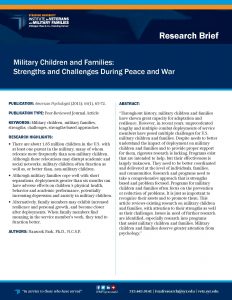Original Publication
American Psychologist (2011); 66(1), 65-72.
Publication Date – December 06, 2013
Publication Type – Peer-Reviewed Journal Article
Author:
Research Highlights
• There are about 1.85 million children in the U.S. with at least one parent in the military, many of whom relocate more frequently than non-military children. Although these relocations may disrupt academic and social networks, military children often function as well as, or better than, non-military children.
• Although military families cope well with short separations, deployments greater than six months can have adverse effects on children’s physical health, behavior and academic performance, potentially increasing depression and anxiety in military children.
• Alternatively, family members may exhibit increased resilience and personal growth, and become closer after deployments. When family members find meaning in the service member’s work, they tend to function better.
Abstract
“Throughout history, military children and families have shown great capacity for adaptation and resilience. However, in recent years, unprecedented lengthy and multiple combat deployments of service members have posed multiple challenges for U.S. military children and families. Despite needs to better understand the impact of deployment on military children and families and to provide proper support for them, rigorous research is lacking. Programs exist that are intended to help, but their effectiveness is largely unknown. They need to be better coordinated and delivered at the level of individuals, families, and communities. Research and programs need to take a comprehensive approach that is strengths based and problem focused. Programs for military children and families often focus on the prevention or reduction of problems. It is just as important to recognize their assets and to promote them. This article reviews existing research on military children and families, with attention to their strengths as well as their challenges. Issues in need of further research are identified, especially research into programs that assist military children and families. Military children and families deserve greater attention from psychology.”
Implications
For Practice
Although many children in military families adjust well to the challenges of military life, some children, especially those with special needs, may still face significant problems. When military families establish strong relationships and have strong, supportive social networks, they perform well and display more resiliency during challenging times. Previous research has found that the families that function most effectively during relocations and other major transitions related to military life tend to be active, optimistic, self-reliant and flexible. Communities, neighborhoods, schools and extended family play a significant role in the well-being of military children during deployment. The wellness of military children should be approached at more than the individual level, as the greater community environment has a significant impact on children’s psychological health during deployment as well. Community environments affect children’s adjustment and coping, and parental stress, which can be mitigated by community support. Teachers and school administrators are in a unique position to provide support and assistance to military children and their families. To continue encouraging well-being among military children, parents and community members should work together to foster an open environment, where children can raise questions and concerns.
For Policy
The military might consider implementing additional training programs for their service members on how to discuss deployment with family members. With demands on service members and their families being greater now than in past years, policy makers might consider funding more support programs for family members as well. Additionally, current programs need to be expanded, and would ideally focus on more comprehensive approaches to social stability and reducing the stigma associated with seeking mental health care. Many formal and informal resources already exist to support military children and families, but further assistance, support and engagement involving the broader community is still needed.
For Future Research
Future studies should focus on identifying the specific strengths and assets that help military children function well during a deployment, including reviews of current interventions to determine their success in helping military children and families throughout the deployment process. As most current studies only focus on the effects of deployment during the time of actual deployment, more long-term studies are needed to determine both the short and long-term effects of deployment on children and families. Since many service members experience mental health problems upon their return, research is needed on the effect the service member’s mental and/or physical health concerns have on family members, including coping, adjustment and health concerns in grandparents, and others beyond the traditional nuclear family. Because previous research has introduced the important role siblings play in an individual’s well-being, in the future, researchers should focus on the challenges facing brothers and sisters of service members, as well as the impact siblings have on military children. Many of the challenges military families face are moderated by interacting factors, such as branch of service, age, education, ethnicity, and pre-existing problems and assets. Future studies should focus on the relationships between these factors, and how they interact to determine post-deployment outcomes for these families. Additional research on the experiences of National Guard and Reserve families, who often have less access to support services, would also be valuable. Finally, future studies should explore the challenges specific to military families with a special needs child, and what additional support these families may need.

